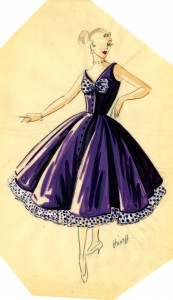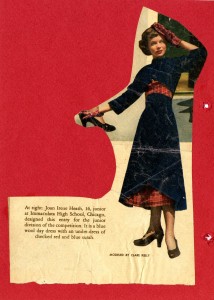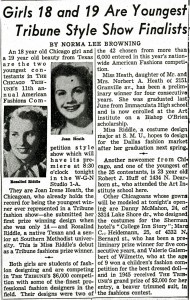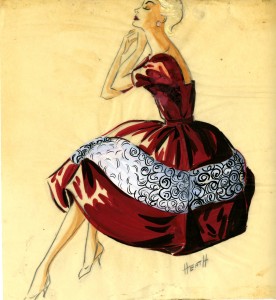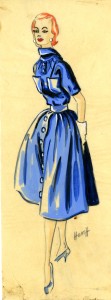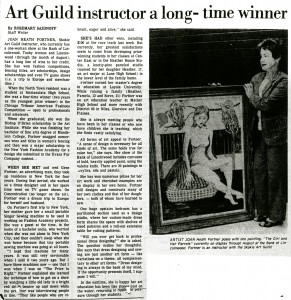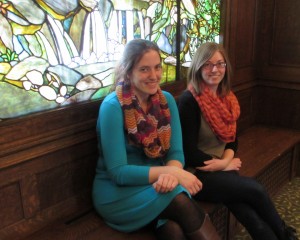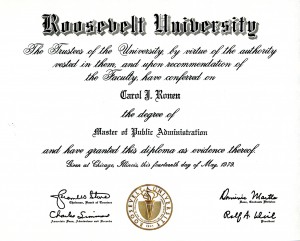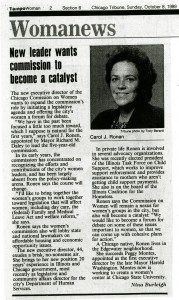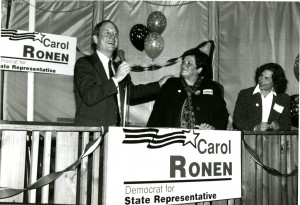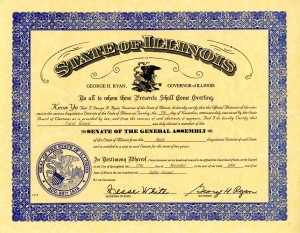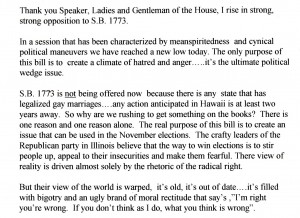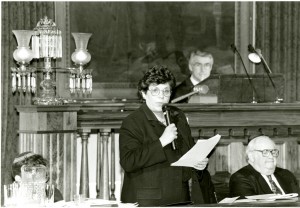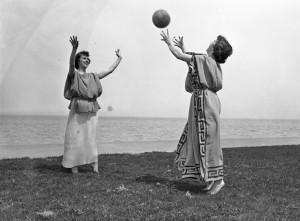
Mundelein College Classics students, n.d. from the Mundelein College Collection at the WLA.
When I first heard that the Board of of Directors of Sweet Briar College (SBC) in Virginia voted to close the women’s college due to “insurmountable financial challenges,” all I could think about were the similarities of the situation to Mundelein College. As a Graduate Assistant at the Women and Leadership Archives, which holds the Mundelein College Collection, I am incredibly familiar with the plight of women’s’ colleges.
Mundelein was a Catholic women’s college founded and operated by the Sisters of Charity of the Blessed Virgin Mary (BVMs). The college opened its doors in 1930 and offered students a liberal arts education for over 60 years. In 1991, Mundelein “affiliated” with Loyola University Chicago. Like many women’s and small colleges, Mundelein ran into financial troubles in the 1980s. Enrollment was steady, but not growing. The college had over $4 million in debts and needed to upgrade buildings and equipment. Salaries were low and had been that way for a while. The college either had to make major staff cuts in an effort to reorganize a more fiscally sound school or consider a merger with a university willing to take on Mundelein’s debt
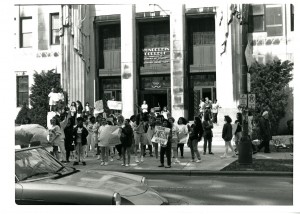
Mundelein College students protest the affiliation.
On March 19, 1991, Mundelein announced that it was in negotiations with its next-door neighbor Loyola University Chicago about a merger or affiliation. While the administrators of both schools emphasized the commonalities of the Catholic institutions and benefits of affiliation, students saw it differently. They marched with banners and signs in front of the Skyscraper chanting “Save our college!” and “60 more years!” A group called Concerned Students for Mundelein initiated a letter-writing campaign to tell alumnae what was going on and ask for their help in preventing a Loyola takeover. At the Board of Trustees meeting to vote on the affiliation, students wearing black with red armbands staged a sit-in.
On April 15, 1991, Mundelein College and Loyola University Chicago administrators signed an agreement that created “Mundelein College of Loyola University.” It happened so quickly that many students and alumnae felt blindsided.
The Mundelein Student Government Statement of Position makes this clear; the students write that the trust between Mundelein students and the administrations and boards of both institutions must be established. Mundelein students had chosen to go to a small, women’s college and were being thrown into a university that resembled more of a state school. Also, as expressed in by Mundelein Student Government representatives in their Statement of Position, many Mundelein women did not feel welcome at Loyola, based on a history of the use of terms like “mundle bundle” and the “girls’ school next door” by Loyola students, creating the perception among Mundelein students that Loyola did not encourage women and minorities to take on leadership positions of power and authority.
Alumnae also felt angry and cheated by the college and its board. Alumna Jane Trahey knew that Mundelein was experiencing financial difficulties, but she didn’t know how bad it was: “I wanted to sue the Board because I think they were negligent. They didn’t pursue all possible avenues. I don’t understand how they could have looked at the financial situation and studied the balance sheets for the last five years and not said ‘Something is seriously wrong here and we have to act now.’ Mundelein graduates never had to opportunity to rally the cause, to raise the money, to keep the college alive. I think we could have done it.”
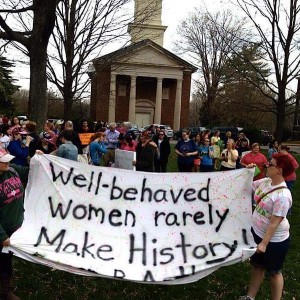
Protest at Sweet Briar.
When the Sweet Briar College announced its decision to close to students, faculty, staff, and the world in early March, many of the reactions were similar to those at Mundelein. Students felt blindsided. Both students and faculty took action with a sit-in protest at the President’s house where they waved signs protesting the closing of Sweet Briar. Although many of the students present at the sit-in acknowledged their lack of control over the situation, they felt the need to voice their dissent.
Unlike at Mundelein, alumnae and faculty have taken their cause to the next level. Shortly after the closing was announced, alumnae formed Save Sweet Briar to stop the college from closing and “provide accurate information to students, faculty, and alumnae about the true financial condition of Sweet Briar College and the viable alternatives to closure.” Currently, their goal is to raise money to fight the closure. The fund has had $5.2 Million pledged, $10.2 Million pledged over 5 years, and $1 Million donated.
Also unlike Mundelein, the closing of Sweet Briar College has made it to the courts. The Commonwealth of Virginia filed suit to keep Sweet Briar open. Additionally, a group of faculty and staff filed a motion supporting the lawsuit.
Although Mundelein College no longer exists, its records still do. Established in 1994, the Women and Leadership Archives grew out of the need to preserve Mundelein’s records and expanded to collect the papers and records of individual women leaders as well as organizations. What will happen to Sweet Briar’s records once the college is gone? I emailed John Jaffe, the Director of Integrated Information Systems/CIO at Sweet Briar, and he said that if the college closes “there are plans in place to consolidate all records of the college into the existing archives. In addition, the entire archives will be moved to a senior research level institution in the Commonwealth where they will be preserved and made available to scholars.”
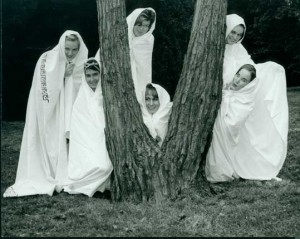
The Chung Mungs at Sweet Briar, 1965. Archival Photos from Mary Helen Cochran Library. CC BY-NC
Unlike Mundelein College, Sweet Briar is closing in the digital age and the college’s history is documented online. It has two Tumblrs (one officially sponsored by the Tusculum Institute at SBC and one unofficial site run by an alumna). Papers about the history of the college written by SBC students in courses called “Doing Sweet Briar History,” “History of Sweet Briar,” and “Practicum in Sweet Briar History” are available on the SBC library website. An Omeka site with archival photos from the Mary Helen Cochran Library makes it its mission to provide widespread access to archival photos and similar photos are available on the library’s Flickr. Once Sweet Briar closes, what will happen to these digital resources? The unofficial Tumblr will continue as long as the alumna running it receives material to post, but who, if anyone, will manage the other sites? Will Sweet Briar’s website still exist once the college is gone or will it only live on through the Wayback Machine? If another archive takes SBC’s physical collections, will they also maintain the digital footprint of Sweet Briar?
In addition to its archives, Sweet Briar has a museum and the college itself makes up a district listed on the National Register of Historic Places with 22 contributing structures. The campus also contains a slave cabin that is open to the public and a slave cemetery with 60 graves. While it may not be possible to #SaveSweetBriar, I hope that we can #SaveSweetBriarsHistories.
Mollie is a Graduate Assistant at the WLA and is finishing her last semester of her MA in Public History at Loyola University Chicago. In addition to sharing authority, she enjoys biking, making/eating pie, and playing the musical saw.
Loyola University Chicago’s Women and Leadership Archives Blog is designed to provide a positive environment for the Loyola community to discuss important issues and ideas. Differences of opinion are encouraged. We invite comments in response to posts and ask that you write in a civil and respectful manner. All comments will be screened for tone and content and must include the first and last name of the author and a valid email address. The appearance of comments on the blog does not imply the University’s endorsement or acceptance of views expressed.
